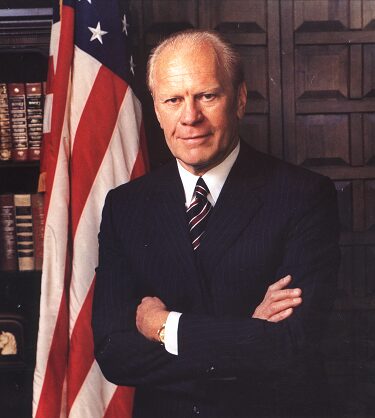Gerald R. Ford*
Class of 1983
- Thirty-eighth President of the United States

I hope history will record that I healed the divisions in our country following the tragedy of Watergate and the tragedy of the Vietnam War.
Born Leslie Lynch King Jr. in Omaha, Nebraska, in 1913, Gerald Ford's parents divorced in 1915. His mother took him to live with her parents in Grand Rapids, Michigan, where she married Gerald Rudolph Ford, a paint salesman. Formally adopted, the future president was renamed after his stepfather, to whom he became very devoted.
Growing up in the Great Depression years, Ford mowed lawns and worked at a Greek restaurant and an amusement park. He excelled at football and was named both all-city and all-state center in high school. He also read Horatio Alger novels. "They were my favorites and probably inspired me to study and work hard," he once said.
Ford attended the University of Michigan, paying his way by waiting tables in the university hospital cafeteria. He lived in his fraternity house, where he washed dishes to earn his board. For three years, he played varsity football for Michigan and was selected Most Valuable Player in 1934. He played in the Shrine East-West game in June 1935 and the Chicago All-Star game in August 1935.
Ford turned down pro football offers because he wanted to become a lawyer. He accepted an offer to become the freshman boxing coach and assistant football coach at Yale University, where he was admitted to law school. He earned his law degree in 1941.
Shortly after the bombing of Pearl Harbor, Ford joined the U.S. Navy. He spent 47 months on active duty, attaining the rank of lieutenant commander. After the war, he returned to Grand Rapids, where he practiced law for two years. He entered Republican politics and, in 1948, was elected to represent Michigan in Congress.
Ford became chairman of the House Republican Conference in 1963. In 1965, he was elected House minority leader. In 1973, following the resignation of Vice President Spiro Agnew, Ford took the oath of office as vice president. In August 1974, after Richard Nixon's resignation, Ford became the 38th president of the United States, serving from 1974 to 1977.
Ford once said of his Horatio Alger Award, "It celebrates success. I think of success as a combination of a number of things, but mainly it is taking satisfaction in achieving personal and career goals. To do that, however, there is no question of needing a college education. The education of our children is vital to the future of the United States."
